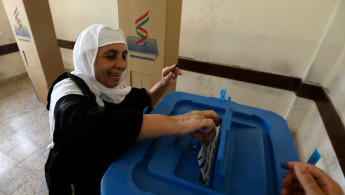Iraqi Kurdish MPs rule out parliamentary elections in November
Parliamentary elections in the Iraqi Kurdistan region scheduled for this November are not expected to be held in time due to disagreements among the political parties, Kurdish lawmakers said to The New Arab.
The semi-autonomous region held general elections on 30 September 2018. Fresh elections were scheduled for 1 October 2022, however, the regional parliament voted to extend its term for one year amid disagreements between the Kurdistan Democratic Party (KDP) and the Patriotic Union of Kurdistan (PUK) over electoral constituency boundaries.
"18 November has been set as the date for the elections" to the 111-seat legislature, Dilshad Shihab, spokesman for the regional presidency announced on 26 March.
"Unfortunately, the current political atmosphere is not suitable for holding elections," Sarko Azad, lawmaker in the Kurdistan parliament from PUK, told TNA.
"The parliament should convene by early May, amend the election law and renew the mandate of the electoral commission. But there is no possibility for the parliament to convene any soon, thus holding the elections in time is a far possibility, especially after tensions between the KDP and the PUK reached a deep stage," he said.
There is another possibility that Iraq's Supreme Federal Court, noted the MP, to announce a ruling regarding the parliament's extension of its own term.
"It is yet to be seen whether the two parties will abide by the court's ruling," Azad said.
Bahman Abdulla, a lawmaker from the KDP, said TNA that the party have attempted extended negotiations with other political parties.
"Unless the political parties reach an agreement outside the parliament, it is very hard for the parliament to set the stage for the elections," Abdulla said. "The KDP was flexible with the other political parties to reach a consensus on the issue. Unless the parties reach an agreement, it is very hard for the elections to be held in time."
For his part, Handren Mohammed, the head of the Kurdistan Independent High Electoral and Referendum Commission, told TNA, "We have the time to hold the elections in 2023, we hope the parliament will accelerate in dealing with the legal issues, especially by re-authorising the commission to oversee the upcoming election."
The election bureaus of the two parties held a flurry of meetings in the past weeks and reached a major understanding on how to amend the region's elections law and re-authorise the region's elections commission to conduct the elections.
However, both parties failed to reach any progress in regards to the boundaries of the electoral constituency for minorities. Thus, they have asked the United Nations Assistance Mission for Iraq (UNAMI) to mediate between them to reach a consensus.
"We are in touch with the parties to provide, at their request, options for the way forward. We provided options last week. It is for the parties to consider these options," a UNAMI spokesperson said to TNA via email on April 13, refusing to be named.
"We would like to reiterate that it is imperative to conduct the long-delayed elections, and UNAMI stands ready to provide further advice and technical support if requested by the parties," the spokesperson added.
The two parties stalled all discussions on the issue in the aftermath of a Turkish drone attack on Sulaimaniyah international airport on 11 April. The airstrike targeted Mazloum Abdi, a Kurdish commander of the Syrian Democratic Forces (SDF), but he survived. The two parties accused the other of providing information to Turkey to target Abdi.
KDP controls the regional government in Erbil and has 45 seats in the current assembly. Together with the 21-seat PUK, which has produced all Iraqi presidents since Saddam Hussein's fall in 2003, the two parties dominate politics in Iraqi Kurdistan.
The former speaker of the Iraqi Kurdistan region parliament, Yousuf Mohammed Sadiq, the president of the New Generation Movement (NGM) opposition party Shaswar Abulwahid, NGM's lawmaker in the Iraqi parliament Sirwa Abdulwahid and NGM's MP in the Kurdish assembly Kawa Abdulqadir have raised separate legal cases against the speaker of the Kurdistan region's parliament, Rewaz Fayaq, and the president of Kurdistan region Nechirvan Barzani.
The plaintiffs argue that the extensions are contrary to articles five and twenty of the Iraqi constitution, the principles of democracy and holding fair elections every four years according to Article 51 of the Kurdistan region's election Law 1 of 1992. Hence, they asked the court to revoke Law 12 of 2022 and oblige the Kurdish authorities to hold a general election soon.




 Follow the Middle East's top stories in English at The New Arab on Google News
Follow the Middle East's top stories in English at The New Arab on Google News


